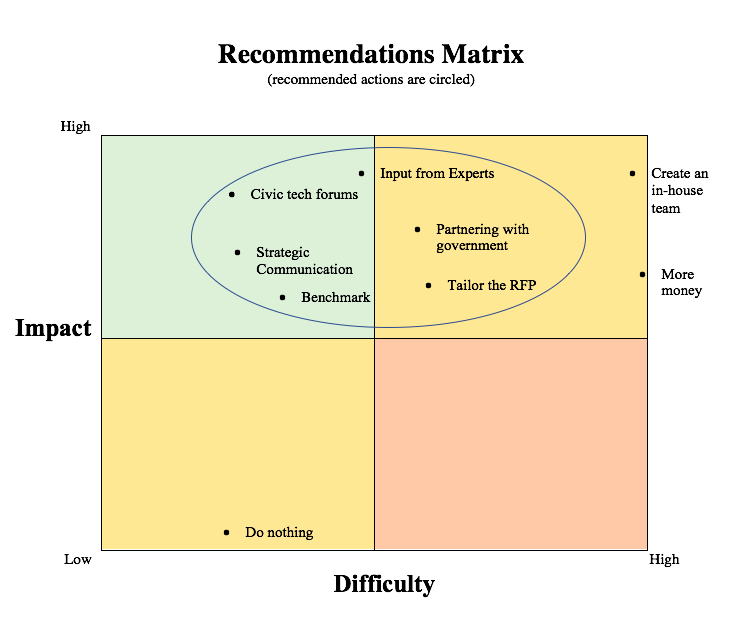Each year, the students at Harvard’s Kennedy School of Government complete year-long research projects similar to a capstone project. Community partners are invited to propose topics or challenges for research for students. A few years ago, Cathy Wissink proposed a topic focused on innovation sustainability in cities. After multiple conversations and a few years time, Kellen Pead took us up on the project and completed this report on innovation sustainability in cities. We see this work as foundational for future research. Thanks to Kellen for getting us started — we look forward to working with future HKS students to continue the discussion.
Civic tech has been shown to improve efficiency, economic equality, and government transparency. Before Code for America, applying for food stamps in California was a 45-minute process that prevented 60 percent of those eligible from enrolling. With a user-centered approach, Code for America redesigned the digital application process, reducing the average application time to eight minutes. Successful projects like this generate wild optimism for what the industry is capable of, while spectacular failures demonstrate that there’s a right and a wrong way of approaching civic technology.
In the spirit of open information, I wanted to share a few interesting observations I made from my report Civic Technology: Assessing the Factors that Impact Sustainability.
Past reports are too broad or too narrow
As leaders of the civic tech movement, the Omidyar Network and the Knight Foundation have released groundbreaking and insightful reports on how to improve civic tech. Unfortunately, there isn’t an ‘industry standard’ definition for civic tech, forcing organizations to create their own definition. Depending on the definition, past reports have either made limited one-size-fits-all recommendations that are too broad to have a meaningful impact or are so narrow that they focus on a single sector and make recommendations that overlook the interconnected nature of the industry.
The problems of an interconnected industry
Those familiar with civic tech know many of the problems facing the industry, such as lack of money, legacy systems, risk-averse policymakers, and changes in leadership support. However, the most difficult problems are less pronounced because they result from the interconnected nature of the industry. These problems include limited access to government purchasing, not understanding difference sectors, not incorporating citizen input, and communication problems.
These issues suggest the public, private, and nonprofit sectors have different ways of getting things done and are struggling to work together. Even more troubling is that they aren’t working enough with the end user.
The shortcomings of the past shouldn’t determine the future
After being immersed in civic tech literature, conversations, and ideas for the last seven months, I’ve realized that civic tech leaves much to be desired. The silver lining is history has shown that tech industries go through a considerable learning curve. Given that it’s a relatively new and interconnected industry, it’s reasonable to believe civic tech is experiencing similar growing pains and needs more time to work out its problems.
The goal of my project is to help the industry get over the curve by outlining some of the barriers that hinder sustainability. Admittedly, the customized recommendations in the report fall short of ensuring sustainability. While this post highlights many challenging obstacles, people shouldn’t be discouraged from engaging in civic tech. In fact, there has never been a better time to join the movement. Civic tech is increasingly attracting investment, which not only creates more opportunity but suggests people recognize the potential benefits. However, we must be systematic with how we approach civic tech opportunities. Sustainability can happen, but only with steady growth and progress.
 Kellen Pead received a Master in Public Policy from Harvard University, operates a civic tech blog and is launching a civic tech podcast (thinkingcivictech.com). Kellen was introduced to civic technology while working for the Office of New Urban Mechanics and has spent the last seven months researching the factors that impact civic tech sustainability. In addition to his work with civic technology, Kellen has eight years of experience in user-centered design, entrepreneurial management, real estate and urban planning.
Kellen Pead received a Master in Public Policy from Harvard University, operates a civic tech blog and is launching a civic tech podcast (thinkingcivictech.com). Kellen was introduced to civic technology while working for the Office of New Urban Mechanics and has spent the last seven months researching the factors that impact civic tech sustainability. In addition to his work with civic technology, Kellen has eight years of experience in user-centered design, entrepreneurial management, real estate and urban planning.

